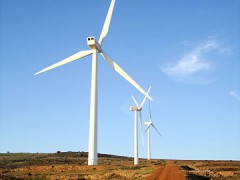An Emerging Green Economy?

This article was originally drafted by the African Center for Economic Transformation , Special for Issue 2012o of the newsletter “West Africa Trends” as part of the Rockefeller Foundation’s Searchlight Process. For more Searchlight content on futurechallenges.org, please click here.
Developing green economies may provide an innovative new pathway for growth. But to tap into the potential offered by this new sector, Africa needs about US$675 billion by 2030. Becoming a green economy is difficult because of the time gap between short-term costs and long-term benefits, and the price gap between market prices and ecological prices. So, significant economic reforms are needed to jump-start the process. Moving to a green economy is therefore going to be a major challenge for the West Africa Region. Even so, some concerted efforts are under way.
Several countries have set up national authorities to tap into opportunities offered through the Clean Development Mechanism (CDM) and Reduced Emissions from Deforestation and Degradation (REDD). But only a few projects have come online, reflecting the limited capacity of countries to develop bankable projects. So, developing the capacity of technical staff in governments to design strategic plans and finding ways to bring small farmers into this framework can have important benefits, especially for the poor, who will bear the brunt of climate change given the greater dependence on natural resources.

Darling National Demonstration Wind Farm in Cape Town, South Africa. By Warren Rohner from Cape Town, South Africa (Darling Wind Farm) [CC-BY-SA-2.0 (www.creativecommons.org/licenses/by-sa/2.0)], via Wikimedia Commons
Renewable energy—especially in solar and domestic cooking fuels—is being pursued with various levels of success. Renewable energy entrepreneurs in the region are assembling solar panels, efficient cooking stoves and biogas digesters, supported by government subsidies to increase uptake. Challenges start with advocacy programmes to change attitudes of communities towards new energies. And subsidies for new technologies should increase uptake in appropriate ways. For instance subsidies for liquefied petroleum gas in Ghana have created gas shortages, as taxis shifted to using gas rather than petrol.

Solar hot water system installed on low cost housing in the Kouga Local Municipality, South Africa. By NJR ZA (Own work) [CC-BY-SA-3.0 (www.creativecommons.org/licenses/by-sa/3.0) or GFDL (www.gnu.org/copyleft/fdl.html)], via Wikimedia Commons
Cities in the region have also started embracing the vision for a green economy. Abuja is creating a green city. Lagos has developed Bus Rapid Transit systems to reduce traffic. And Accra has an initiative for green buildings.
